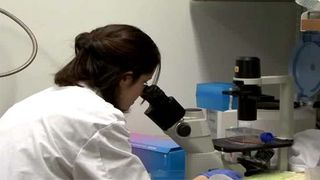Drug Halts Growth of Stubborn Breast Cancer Cells

The tricky breast cancer cells that scientists say survive through chemotherapy treatments and sprout new cancer growths elsewhere in the body may soon meet their match.
A new study shows that these cells, called breast cancer stem cells, rely on a certain molecular pathway to survive, and that when this pathway is turned off by a drug, the cells stop dividing.
Not all types of breast cancer have these stem cells, said study researcher Dr. Kornelia Polyak, an associate professor of medicine at Harvard Medical School.
But about 50 percent of the hard-to-treat "triple-negative" breast cancer patients do have them, Polyak said. Triple-negative breast cancers get their name from the fact that they lack three hormone receptors found in other breast cancers.
There are no targeted therapies (which are treatments designed to selectively kill cancer cells) currently approved to treat triple-negative breast cancers, so chemotherapy (which affects many cells in the body) remains the only option, and it does not work for 80 percent of patients, Polyak said.
The new study reveals a way that a targeted therapy might work. The researchers found 15 genes that had higher levels of activity in breast cancer stem cells than in other breast cancer cells. They then found that all these genes played a role in a single pathway in the cells — called the Jak2/Stat3 pathway.
The high level of activity of the genes led the researchers to discover that not only is this pathway activated in breast cancer stem cells, but also that the stem cells need the pathway to be turned on in order to divide.
Sign up for the Live Science daily newsletter now
Get the world’s most fascinating discoveries delivered straight to your inbox.
"When it's off, the tumors stopped growing," and some of the cancer stem cells died, Polyak said. Other cells, which do not have this pathway activated, can survive even if this pathway is blocked. So, the researchers concluded, blocking this pathway with a drug would be a good strategy for selectively halting the growth of these cells.
"Cancer stem cells" are not the same as other stem cells, Polyak noted, they are simply cells within a tumor that seem to give rise to new tumors more easily than other cancer cells do. Because of the many genetic changes that constantly occur in cancer cells, any given cancer cell may become a "cancer stem cell," or can revert back.
"We're very excited about the findings," Polyak said, because the pathway is not only crucial to the growth of the cancer stem cells, it is also involved with the growth of blood vessels that feed tumors and with the production of inflammation around tumors. By blocking this pathway, she said, "we can hit tumor multiple different ways."
The study was conducted on human breast cancer cells growing in lab dishes and injected into mice to form tumors, so the findings need to be validated in clinical trials done with breast cancer patients.
But drugs that block this pathway, which can be taken orally, are already being tested in several types of blood cancer, so much of initial safety testing has already been done, Polyak said. In fact, a clinical trial is set to begin in patients with triple-negative breast cancer at the Dana-Farber Cancer Institute in Boston later this year, she said.
Triple-negative breast cancers make up about 15 to 20 percent of breast cancers and tend to occur in younger women, those with BRCA1 gene mutations, and black women.
Pass it on: Scientists have identified a way to selectively kill breast cancer stem cells.
Follow MyHealthNewsDaily Managing Editor KarenRowan on Twitter @karenjrowan

